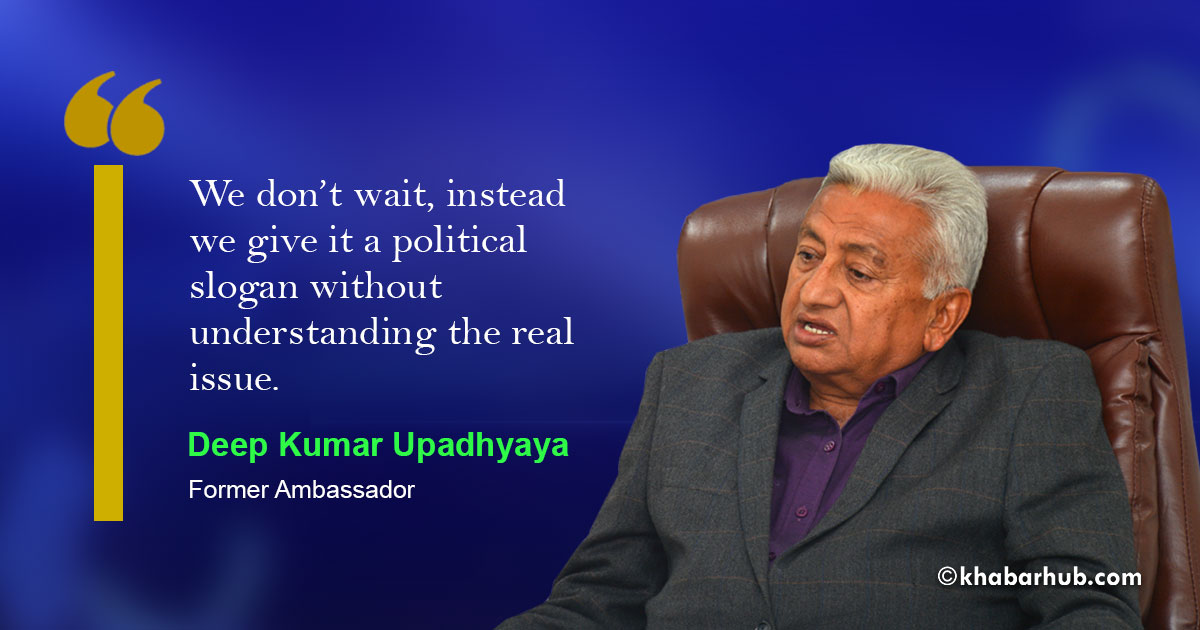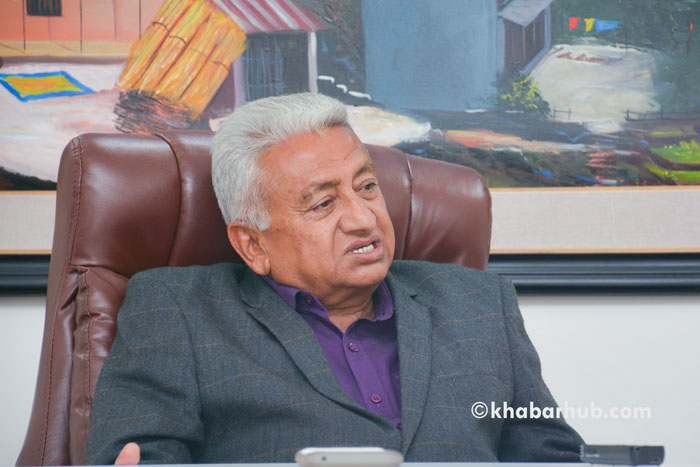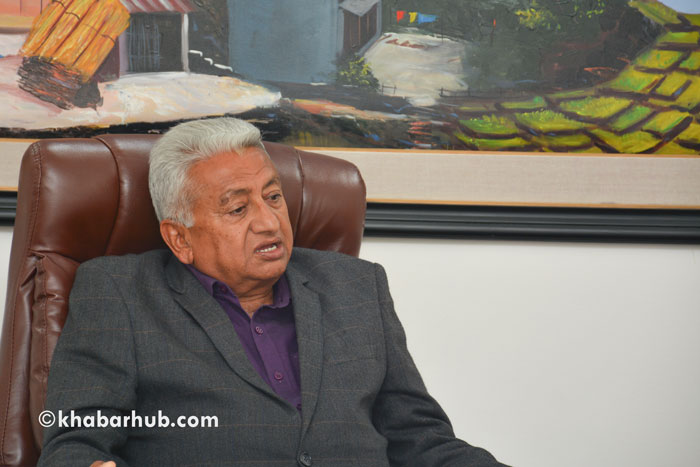0%

The compulsory test to trace the presence of chemicals in imported vegetables and fruits from India has been ordered by the Supreme Court and the same was halted by the government. Political hue and cry are being raised in Nepal among the rumors taking round that India has pressured the Government of Nepal not to conduct the test of chemicals in imported vegetables and fruits.
It is because media had published a letter sent by the Embassy of India, Kathmandu in which a targeted mention of chemical test on vegetables and fruits from India need to be stalled immediately was made. In a conversation with Khabarhub, former Nepali Ambassador to India, Deep Kumar Upadhyaya said that sending such letter was a routine diplomatic process and it shouldn’t be reckoned as a pressure. Excerpts:
What do you have to say on the entire issue which is rocking Nepal?
India-Nepal relation is very sensitive in comparison to other countries. From both the sides goods and people cross the border every day. As they export to us, Nepal also exports to them. We are not self-dependent, so quite naturally we have to be dependent upon other countries for goods and services. As it is true for us, it is true for the whole world. Both the countries Nepal and India are members of WTO (World Trade Organization) and there are some guidelines mentioned in the bilateral trade agreements to be followed by both the countries. Neither India nor Nepal mix chemicals in their agricultural produce to adversely affect the common people at both the sides of our shared border. Yes, we can go for systematized chemical checks and health certification on food items in Nepal and India but the joint mechanism of cooperation has to be worked out.

The integrated check-post at Birgunj border has served well in launching quarantine on food items crossing the border to both countries and it has worked well for both. We have not further updated the system; it falls within our responsibility. Both the countries have already agreed to respect the standards of lab test and health certification issued in their respective country on food items including vegetables and fruits. We never wait and give it a political slogan without understanding what actually the issue is. Indian lab certification will be accepted by Nepal and India will accept the test conducted by Nepal. It is not necessary for both the countries to conduct a simultaneous test on gross items of fruits and vegetables entering their border. Nepal and India have already agreed to this arrangement.
Then, what impelled India to stop test of harmful chemicals on imported vegetables and fruits if there was a mutual agreement to this effect?
You are referring to a letter sent by the Embassy of India. It is a routine letter that every embassy around the world sends to communicate with the host country for appraisal of the facts concerning the life and property of their citizens. It is quite a normal norm in the world of diplomacy. We too sent similar kind of letters when the border was blocked after the devastating earthquake in 2015. But, this does not become a big public issue in India as it happens in Nepal. In India, people do not give much attention even if the Indian parliament highlights the issues between China and India or for that matter India and Pakistan. Our Nepali political tradition is somehow obsessed with the issue of India and we cannot do much about it.
What is the procedure involved for sending a note verbale on issues like this?
First such ‘note verbale’ are sent to the Ministry of External Affairs and the letter as mentioned above is sent through CC. The note received by the Ministry of External Affairs under the normal decorum of procedure should have discussed within the department and matter would have ended there. Unfortunately, this didn’t happen and those who handled the issue allowed it to slip outside the realm of routine diplomatic communication. This shows that the present government of Nepal is inept in understanding the finesse and nuances of good governance. The Cabinet decision was also very abrupt without going into the details of the present issue.

Do you mean to say that it was wrong to go for chemical test on imported fruits and vegetables?
No, not at all….no one has stopped us from doing that. We are a sovereign country and it is within our right to conduct any test we want on any item that we import from any country including India. Nepali traders pay for the goods and import the same. What I mean to say our own Nepali traders suffer an untold loss when our government goes for such test without full preparation thereby delaying the clearance of goods particularly fast deteriorating green vegetables and fruits. We need to build our own capacity on all fronts. Instead, the government allowed the whole issue to go in a totally different direction. If only Government had a prior talk with the ministry of commerce and external affairs and trading and business groups like FNCCI (Federation of Nepalese Chambers of Commerce and Industry) and other business groups in Nepal, such a political mess wouldn’t have arisen and the government would have been on right track without unwanted political fallout.
So you think pesticides test should not have been halted?
Nepal is a sovereign country and it can test imported goods that had already received clearance from the origin country again, if necessary. India should provide an unrestricted market to Nepali goods and we should stress that in dialogues with the southern neighbor.
There are accusations that the Indian Embassy swung into action to halt pesticides testing. What’s the reality?
It is a common diplomatic process. The commerce department at Indian embassy becomes active once there are any hurdles in trade to Nepal from India. It does its duty accordingly and it is a normal practice. But, Nepal lacks such a system. We don’t follow a proper channel for negotiations and instead we create a hullabaloo for no reason. Ultimately, it invites trouble.

Importers have been complaining that Indian authorities stop Nepali goods-laden trucks for long for a test. Why the government has kept a mum on the issue?
That’s our problem. We don’t follow formal channels. If information is conveyed properly, such issues can be sorted out through talks with the Indian side. It’s a part of diplomacy.
We should not feel inferior and should sort out such issues through diplomacy. We call ourselves a sovereign country but never exhibit that in practice. Making a hue and cry over an issue is not good.